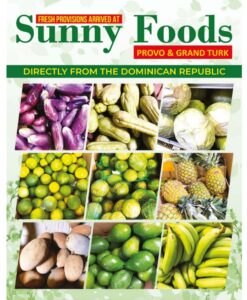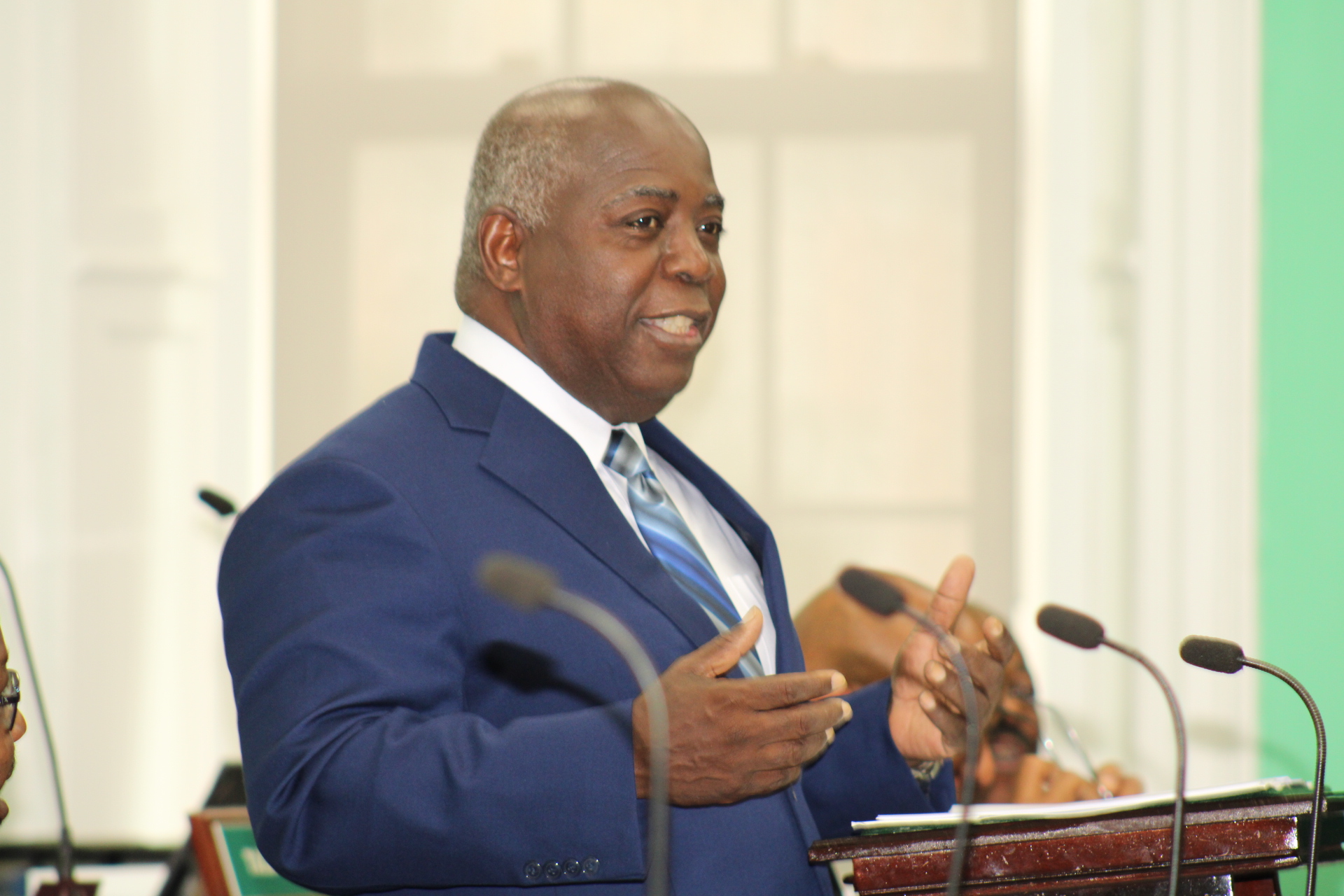By ERIC ROSE
Bahamas Information Services
#NASSAU, The Bahamas, September 29, 2022 – During his Statement on the First Year Anniversary of his Government, in the House of Assembly, on September 28, 2022, Prime Minister and Minister of Finance the Hon. Philip Davis said that the accomplishments of the past 12 months had only been possible because the Bahamian people “stepped up and stepped forward, and worked with us.”
“We are grateful for their trust and confidence, and the partnership we have forged bodes well for the positive national development of The Bahamas,” Prime Minister Davis said.
He added that, although his Government had accomplished a lot in the first year, but there was still “so much to do”.
“We are making good progress on many of the commitments which we made in our ‘Blueprint For Change’,” Prime Minister Davis noted.
“But the war in Ukraine which started back in February, and COVID-related manufacturing and supply chain issues in some of the major markets, have combined to create a new and very serious emergency: a global inflation crisis, which has driven up prices across the world,” he added.
which has driven up prices across the world,” he added.
Prime Minister Davis pointed out that, for a long time now, the cost of living in The Bahamas had been too high. Also, with global inflationary pressures driving prices up across the board, life had become unaffordable for so many Bahamian families.
“The Government is working hard to help the country recover and to provide relief from these multiple crises,” he said. “At the same time, we are also working to bring about the big, transformative changes which will make us stronger, less vulnerable to future crises, and bring us closer to fulfilling our national potential.”
Prime Minister Davis then reviewed some of the highlights of what had been accomplished during the past year, as having been so absorbed in the day-to-day, he pointed out, it was “instructive to step back and look at the big picture”.
In the area of Health, Prime Minister Davis noted that, even before coming into office, they made the point that the economic crisis the country faced could not be fully tackled until the COVID-19 health crisis was being well-managed.
At the time, he said, The Bahamas was performing “very poorly” on regional comparisons regarding the management of COVID.
“We knew our country could do much better,” Prime Minister Davis said.
“We introduced free testing – something the previous government said couldn’t be done – distributed almost one million free medical-grade masks, hired more doctors and nurses, and began to upgrade local clinics,” he added.
“Our commitment continues, with new industrial agreements with the Bahamas Nurses Union, which include salary increases and retention bonuses,” Prime Minister Davis pointed out. “This is simply the right thing to do for those who have done so much to save lives during the pandemic, often at great personal risk to themselves.”
In the Public Service, Prime Minister Davis said, his Government had also settled and was continuing to settle outstanding promotions and regularizations for public sector workers.
“We negotiated union agreements, with The Bahamas Educators, Counsellors, and Allied
Workers Union; The Bahamas Customs, Immigration and Allied Workers Union; The Bahamas Union of Teachers, The Bahamas Nurses Union, The Bahamas Educators Managers Union: we have completed those agreements,” he pointed out.
“It is important to note that these negotiations resulted in the largest-ever remuneration for Bahamian workers in the Public Service,” he added.
“And we approved the return of annual increments for public servants along with an increase in public service pensions.”
Prime Minister Davis stated that, as he indicated earlier, higher prices were squeezing Bahamian households. Therefore, his Government was implementing multiple policies to address the issues which contribute to the high Cost of Living.
He pointed out that the most direct tool his Government had to affect the cost was by reducing import duties and monitoring price controls.
“In the past year, we have therefore reduced import duties on dozens of food items, including healthy options like fruits and vegetables,” Prime Minister Davis said.
He added: “We have lifted the import ban on Canadian beef, which will lower cost of meat to consumers. We have expanded the list of food items on the price control list and have also hired new Price Control Inspectors to ensure compliance with price regulation requirements.
“These are measures which bring some immediate relief, but we know we also must take big steps to reduce reliance on expensive foreign imports.”
Prime Minister Davis pointed out that, in Agriculture, his Government had committed millions of dollars in new investments for food security initiatives, which meant the nation would grow “a lot more of what we eat right here at home”, and create opportunities in Bahamian ownership and employment. He added that his Government had also introduced duty-free concessions for parts to repair fishing and farming equipment.
“We are facilitating direct cash subsidies and concessions for poultry farming, to reduce the reliance on foreign imports,” Prime Minister Davis said. “For the same reason, two new slaughterhouses have been commissioned for New Providence and Eleuthera.
“And the re-opening of packing houses, after four years, will assist farmers with feed, fertilizers and other tools.”
In terms of Affordable Housing, Prime Minister Davis noted that his Government had “picked up the ideological baton” begun under the Pindling-Hanna era, and once again, wanted to support Bahamians in owning their own homes.
“In this first year, we made available 47 new affordable homes in New Providence, in Pinecrest’s first phase of development,” he pointed out. “New housing developments in New Providence and Abaco are also underway, along with a new housing initiative at Ocean Hole in Rock Sound, Eleuthera.”
“We have expanded concessions to first-time homeowners, which includes the purchasing of land, building and purchasing a house, and renovating existing structures,” Prime Minister Davis added. “We increased the level of exemption for VAT on homes from $250,000 to $300,000.
“And we also implemented broad-based reduction of duties on building materials.”
Prime Minister Davis said that Energy was a significant part of the monthly expenditure for households and businesses.
He noted that his Government had launched a programme to implement solar micro-grids, rooftop panels and other solar devices, which were to be deployed across multiple Family Islands. That, he said, would benefit up to 17,000 Bahamians.
“Alongside this we have reduced customs duties for solar products,” Prime Minister Davis said. “We have also reduced to 10%, the duty on electric cars which cost under $70,000. And we are well advanced in negotiations of a 61 Megawatt solar facility to decrease the cost of electricity.
“Bahamians deserve cleaner, more reliable, and more affordable energy, and we are working hard to build the solutions that will get us there.”
Prime Minister Davis pointed out that it had been a priority for my administration to offer both compassion and relief, via both social support and empowerment.
“Our administration is providing substantial support to successful, local feeding programmes run by churches and NGOs,” he said. “The funding for social assistance increased by 50% compared to pre-pandemic levels.”
“We have extended tax breaks and concessions in Grand Bahama and Abaco Recovery Zones,” he added. “We made a $500 lump-sum payment just before Christmas to the unemployed, to provide a little breathing room.”
He continued: “My Government provided relief grants to vendors in Port Lucaya, Downtown Freeport Farmers’ Market, Eight Mile Rock Fish Fry, and Lucayan Harbour and New Bight Fish Fry. We also provided a financial stipend to surrey drivers.”
Prime Minister Davis noted that his Government successfully re-opened schools after two years of online learning.
“And we launched a free WiFi in the parks programme called – Park Connect Bahamas,” he said. “To date, 30 parks across the country have been outfitted with free Internet access.”
“We successfully relaunched Urban Renewal, including the Urban Renewal Band and the Urban Renewal Foundation, which will spearhead a list of social support and empowerment programmes,” Prime Minister Davis added. “The Urban Renewal Small Home Repairs Programme is well underway in Abaco, Moore’s Island, Bimini, Exuma, Cat Island and New Providence.
“And the Disaster Reconstruction Authority launched a Home Assistance Repair Programme in Grand Bahama and Abaco.”
Prime Minister Davis said that, in furthering its commitment to promote Better Government, during the past year, his Government made notable progress on a range of issues.
“We eliminated the travel heath visa which was such a burden to so many Bahamians,” he said. “We enacted legislation concerning the ‘Presumption of death’, in order to allow survivors to more quickly settle the affairs of loved ones, who go missing after circumstances of peril, such as hurricanes.
He added that a Family Island Help Desk was set up in the Department of Local Government to assist local government personnel in navigating red tape, and addressing relevant issues.
“The Revenue Enhancement Unit was re-established to collect over $1 billion in tax arrears through more efficient collection, more effective compliance measures, and enforcement of laws,” Prime Minister Davis noted.
“New carbon credits legislation was passed, which will enable The Bahamas to be compensated for the role that our mangroves and seagrasses play in eliminating carbon from the atmosphere.”
Photo Caption: Prime Minister and Minister of Finance the Hon. Philip Davis speaks, during his Statement on the First Year Anniversary of his Government, in the House of Assembly, on September 28, 2022.
(BIS Photo/Ulric Woodside)


 News1 week ago
News1 week ago
 Caribbean News1 week ago
Caribbean News1 week ago
 News1 week ago
News1 week ago













